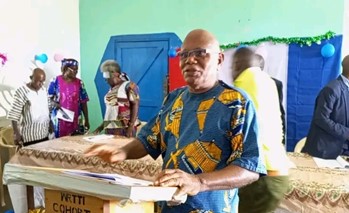Professor Topor wants education prioritized

By Patrick N. Mensah, Maryland County
Professor Wollor Emmanuel Topor of the William V. S. Tubman University in Harper City, Maryland County has stressed a need for government to prioritize education of rural residents.
Serving as guest speaker during the graduation of 36 Pre-service teachers from the Webbo Rural Teachers Training Institute in Konowroken, River Gee County recently, he said rural education is critical and has a direct impact on rural income.
Professor Topor noted that many have blamed Liberia’s high illiteracy and poor economic performance on the 14 years of civil war, but the situation is being compounded by high dropouts, especially amongst rural dwellers.
According to him, indicators for such claims are based on high rate of school dropouts, lesser opportunities for students to have access to quality and affordable primary education, broken homes that lead children to stay on the streets, illicit drugs and alcoholism, among others.
Professor Topor stressed that the Government of Liberia, like governments around the world, has a responsibility to reduce poverty among its citizens, adding that in the absence of an appropriate tool, education remains the best instrument for effective and efficient mobility of the vast number of people in the society.
“While the elites or the so-called educated people (who most are square pegs in round holes) continue to wrongly use education as a weapon in favor of corruption by exploiting the illiterate masses – milking the poor malnourished cow for their conspicuous consumption, telling this story is for future presentation.”
The former dean of the College of Agriculture at Tubman University believes that unless Liberian children are well taught, they would not have the capability to adapt to socio-economic changes that are required for them to compete globally.
[bsa_pro_ad_space id=1]

“We all know the consequences of this as the country isn’t self-sufficient in food production. It is simple; we cannot feed ourselves”, he bluntly added
He said though government has done extremely well by employing more teachers, constructing and renovating several schools across the country, Liberia’s pre and post-war institutions have no significant difference due to limited qualified teachers, inadequate school buildings, insufficient learning materials and incentives, and the unwillingness of trained teachers to take up assignments in rural communities.
He notes that the Zorzor Rural Teachers Training Institute (ZRTTI) in Lofa County; Kakata Rural Teachers Training Institute (KRTTI) in Margibi County, and the Webbo Rural Teachers Training Institute (WRTTI) in River Gee were initiated with an objective to supply well-trained teachers, especially in the countryside, but the WRTTI had been faced with challenges for which the facilities were used as a high school and residence for Peace Corps volunteers years back.
“So, to you the graduates, you’re all valuable assets to the development of current and future generations. It’s therefore, anticipated that you’re to go back to your assigned schools to meet societal expectations through the knowledge you obtained from here, although while meeting societal expectations, you need to lower your own expectations because you will also face some challenges along the way,” he admonished.
Dr. Topor lauded faculty members of the WRTTI for what he termed “difficulties” they went through to harmonize all the mismatch of teachers and students to have completed the curriculum and award graduates’ certificates.
“With the population explosion of promising young people, I can say that your institution is not even close to graduating enough teachers to teach this population, let alone placing them where they are needed.”
“The future for rural education is now; the desire to be educated is written on the faces of our students”, he said.
He noted that without teachers to guide and develop the God-giving potentials of children in these impoverished rural areas, they are not only deprived of a brighter future but their communities as well.
Dr. Topor cautioned that while it’s true that these recommendations may not be a permanent solution to the woes of rural teachers, they should be taken as temporary panacea.
He said while the government is yet to fully execute its development plans for the educational system, the Free and Compulsory Education Act should be revisited for the purpose of reinforcing the necessary budget.
He also recommended that government should provide highly competitive incentives, including salaries and housing for rural teachers, to avoid them leaving their communities of assignment for better opportunities in other areas.
The 36 graduates include 35 males and one female from the Institute’s “C” Certificate Program.
Meanwhile, the graduates during the ceremony lauded the teaching staff and the administration for the knowledge imparted, noting that the knowledge acquired will be used to improve the learning environment of the county and Liberia at large. Editing by Jonathan Browne




















